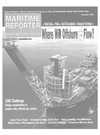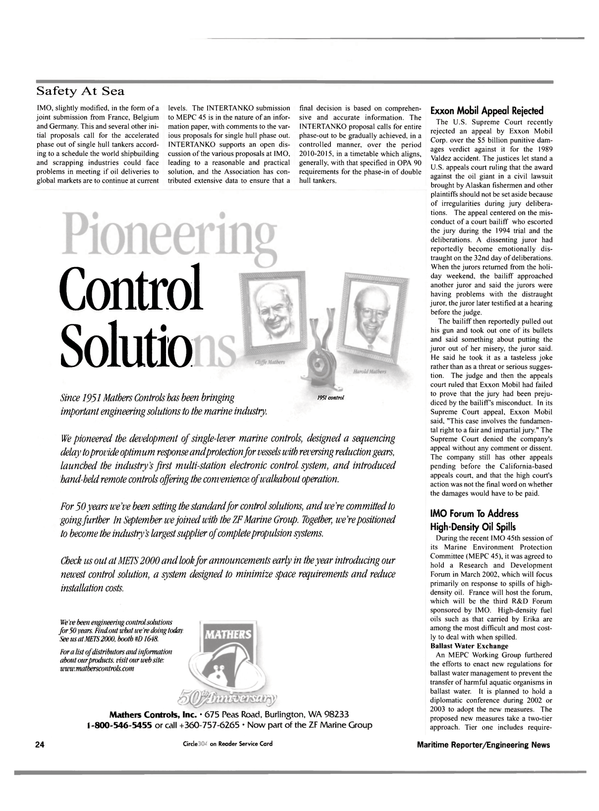
Greek Ferry Disaster Will Result In Safety Enhancements
Debate surrounding one of the worst Greek sea tragedies in decades will continue for years, likely resulting in changes to ferry design, outfitting and/or crew training.
In the wake of the sinking of the Express Samina, which resulted in the death of 80 of its 525 passengers, the Greek cabinet devised a plan to withdraw some 105 aging vessels from the island ferry business by 2006.
While commercial opportunity is obviously not the first thought in the wake of such tragedy, the prospects of replacing more than 100 passenger vessels will be of interest to the international shipbuilding community. The cabinet also agreed to open up the market to foreign operators in 2002, two years earlier than planned.
The Express Samina ferry sank when it hit a well-charted islet just before reaching the Aegean island of Paros. Shipping officials have partly blamed the disaster on the near-monopolies that have developed in the Aegean, saying competition would improve the quality of ships and services. In the weeks following the accident, more than 60 vessels were restricted to port pending safety system upgrades.
While the action initially resulted in the protest of the Greek ferry owning community — as it felt it was being vilified for a one-off incident — most of the vessels are sailing once again and calm seems to have returned.
A bill is expected as early as this month which would liberalize sea transport in Greece, a liberalization which could begin as early as 2002. Measures regarding ship age, seaman training and education, and safety equipment onboard are likely to follow.
Read Greek Ferry Disaster Will Result In Safety Enhancements in Pdf, Flash or Html5 edition of November 2000 Maritime Reporter
Other stories from November 2000 issue
Content
- Cornering the ULCC Niche page: 8
- The Future Of E-Commerce: Will The Maritime Industry Be Left Behind? page: 12
- Shipowners, Charterers Launch New Internet-Based Shipping Exchange page: 15
- Shipbuilders Complain To EU About S. Korean Subsidies page: 16
- Robert Allan Lands Fireboat Design Contract page: 16
- Tribon Solutions Signs Contract With DHI page: 18
- FBMA Babcock Secures TriCat Order page: 19
- Keppel Shipyard Is Awarded Jumboization Contract page: 19
- World Single Hull Tanker Phase-Out Is Coming page: 22
- INTERTANKO Calls For "Reasoned Solution" In Wake Of Single Hull Phase Out page: 23
- Exxon Mobil Appeal Rejected page: 24
- IMO Forum To Address High-Density Oil Spills page: 24
- Greek Ferry Disaster Will Result In Safety Enhancements page: 26
- New Safety Technology Unveiled page: 26
- Oil Instability, consolidation Muddy Offshore E&P Picture page: 27
- World Floater Market Is Stable page: 29
- Olympic Engine Selection Evokes Thoughts Of "Green" page: 31
- Volvo Penta Offers Larger Engine Range page: 33
- MTU Presents New 8000 Series page: 34
- ZF Fortifies Product Line, Business Plan page: 36
- ABS Innovates For Petrobras Project page: 40
- Environmentally Sound, Commercial Efficient Wastewater Treatment page: 45
- Ansell Jones Uniquely Serves Offshore Market page: 48
- Deepwater Business Prospects Ripe page: 49
- W&D Completes Moran Series page: 50
- Atlantic Marine Awarded Additional ATB Contract page: 50
- Klyne Tugs Orders AHTS From China page: 52
- What Happened to the Hunley: ? page: 58
- Companies Bond Together To Form American Salvage Association page: 64
- Gas Ship Design Challenges page: 66
- McAlear Named CEO Of Kvaerner Philadelphia Shipyard page: 73
- Historical Keel Laying Occurs At Ingalls page: 74
- Polish Shipbuilding Industry Consolidates, While Competition Continues To Boom page: 75
- PRS Seeks Strong Comeback, Stresses Safety page: 80
- New Marine Technology: The Hallmark of SMM 2000 page: 81
- The "Wired" Ship page: 88
- Flat Screens, Big Images page: 88
- Wartsila Unveils Plans For The Future page: 89
- Wartsila To Provide Power On Unique Icebreaking Tankers page: 90
- Kvaerner Delivers Explorer of the Seas page: 94
- The SatCom Shakeout page: 95


